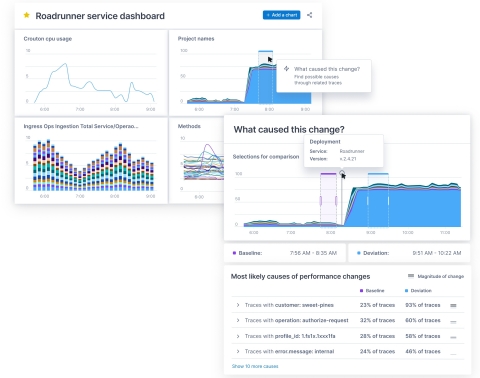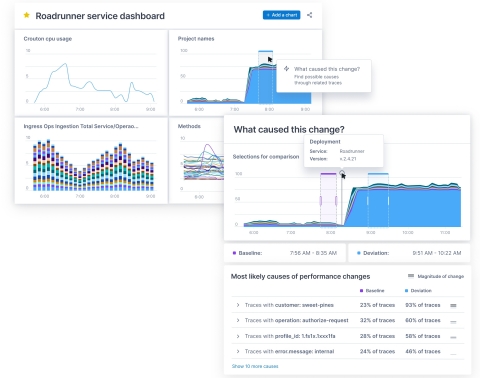SAN FRANCISCO--(BUSINESS WIRE)--Lightstep, the cutting-edge observability software built by ex-Googlers to understand complex systems at scale, today announced the general availability of Change Intelligence. While AIOps is frequently advertised as a way to dramatically improve IT operations, it often fails to deliver, in part because today’s software applications are too dynamic: software, infrastructure, and user behavior are all changing faster than ever before. Lightstep has embraced those changes and put them at the center of analyzing application performance with Change Intelligence, inspired by work done by the Lightstep CEO Ben Sigelman on Google’s Monarch project.
“Lightstep is the best observability vendor that I have ever worked with,” said Trevor Rundell, Director of Engineering at Drift. “We’re able to get to the root of what caused a change in our distributed systems with just a few clicks.”
The problem with ‘AIOps’ is that it only works by finding patterns in data, in order to better predict recurring situations. While this may be useful in traditional monitoring dashboards that have alerts set on predefined thresholds and predictable situations, the modern practice of observability acknowledges that it’s not possible to know everything that will go wrong in advance, especially in microservices and distributed environments. “Change Intelligence is the ultimate added value that any engineer can get out of their observability system,” said Sam Wierema, Senior Engineering Manager of Infrastructure at MessageBird, one of the fastest-growing software companies in the world.
The X-factor that makes Change Intelligence possible is Lightstep’s groundbreaking time-series database, which can process over a trillion events each day and is built by the same engineers that worked on the Monarch project at Google. Monarch is the globally-distributed in-memory time series database system in Google, that is used internally to monitor the availability, correctness, performance, load, and other aspects of billion-users scale applications and systems at Google. By tightly integrating these metrics with Lightstep’s existing distributed tracing data, engineers can connect cause and effect faster than what was previously possible.
“We took inspiration from the technology we built at Google, took it to the next level, and made it generally available to all Lightstep users,” said Ben Sigelman, Co-Founder and CEO of Lightstep. “With Change Intelligence, any developer, operator, or SRE can instantly understand changes in their service’s health and – most importantly – what caused those changes. In this way, we’re able to actually deliver on the promise of AIOps: to automate the process of investigating changes within complex systems.”
Modern DevOps teams need the ability to answer novel questions about the state of their systems in real time. Until today, understanding what changed and why has largely been an arduous, manual process, with engineers combing through dashboards trying to correlate disparate data to arrive at a theory.
“The truth is that companies are already drowning in data from dashboards, alerts, endless logs – as an industry we’re so afraid of missing data that we collect all of it,” said Daniel ‘Spoons’ Spoonhower, Co-Founder and Chief Architect of Lightstep. “But from talking with customers, we’ve learned that this can create just as many problems as it solves. We’re not looking to add more data or noise – we’re looking to find root causes and resolve issues faster.”
About Lightstep
Lightstep’s mission is to provide clarity and confidence to the teams that build and operate the software that powers our daily lives. Founded by ex-Googlers, the cutting-edge observability platform gives engineers quick insight into how changes in their applications and infrastructure affect their end-users and their business. Lightstep is backed by Redpoint, Sequoia, Altimeter Capital, Cowboy Ventures, and Harrison Metal and is headquartered in San Francisco, CA. For more information, visit https://lightstep.com or follow @LightstepHQ.




